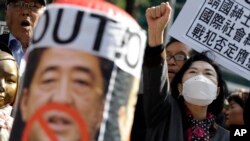For Japanese Prime Minister Shinzo Abe, who will address a joint meeting of the U.S. Congress later this month, there are expectations he will use the high-profile occasion to answer regional demands for a public apology for Japan's wartime atrocities.
However, given how his recent statement of regret was received in South Korea, there may be little he can say that will satisfy skeptics in the region.
In advance of his trip to Washington, Abe addressed the issue of comfort women, the over 200,000 women in Asia who were forced to work as sex slaves for Japanese soldiers during World War II.
In an interview with The Washington Post last week, Abe said essentially that his heart aches when he thinks about the pain and suffering of those victimized by human trafficking.
The comment infuriated some South Koreans, who say it is a way for the Japanese military to sidestep its involvement in wartime sex slavery.
Protest Abe's speech
On Wednesday, about 200 South Koreans protested in front of the Japanese Embassy in Seoul and beheaded an effigy of Abe. They also criticized his plan to speak before the U.S. Congress without speaking to Japan's past war crimes.
Abe's words though did little to appease Ahn Seon-mi, with The Korean Council For The Women Drafted For Military Sexual Slavery By Japan, a group that represents the surviving Comfort Women, who are all now over 90 years old.
Ahn said the group thinks there is a hidden intention in use of the words "human trafficking" in Abe’s sudden comments, meant to downsize the issue by covering the nature of sex slavery.
Abe has appealed to patriotism and nationalism to gain political support for his agenda that includes re-interpreting Japan’s pacifist constitution to take on a more active military role in the region and more conservative free-trade economic policies.
But he also stirred public anger in South Korea and China when he visited a controversial World War II shrine that includes some Japanese war criminals.
Comments by Japanese nationalists saying the comfort women were not forced but participated voluntarily in prostitution, and a cabinet official saying that the government might alter the 1993 Kono Statement that offered apologies and remorse to comfort women, further increased tensions.
Tsuneo Watanabe, a foreign policy analyst with the Tokyo Foundation, said much of the criticism by some of the prime minister’s detractors, and some of the rhetoric by his supporters, do not represent Abe’s views.
“Sometimes Prime Minster Abe is misunderstood as a history revisionist, so- called. I don’t think Prime Minister Abe is and his position is clear," Watanabe said.
Abe has said he will uphold the 1993 Kono Statement, as well as the Murayama Statement in 1995 that apologized for the damage and suffering caused by Japan during World War Two, and the Koizumi Statement in 2005 stating Japan must never again take the path to war.
Clarification possible
When he addresses the U.S. Congress on April 29, Watanabe thinks Abe should clarify his position and could enlist the U.S. to help ease regional tensions over Japan’s wartime past.
“And it’s very important to share these kinds of things with American people. I think that is very important because Americans are very influential to Japan’s regional neighbors," Watanabe said.
But Ahn said Abe has now lost all credibility. She said this is not the first time that Abe said he would uphold the statements. However, she said it was hard to trust him because his actions do not always match his words.
Still, there has been some diplomatic progress made to resolve these grievances. The foreign ministers from Japan, China and South Korea recently met for the first time in three years to discuss this and other issues that divide them.
South Korean President Park Geun-hye also met briefly with Abe while attending the state funeral of Singapore’s late leader Lee Kuan Yew. They reportedly discussed taking further steps to resolve their differences on these historical issues.
VOA Seoul producer Youmi Kim contributed to this report. Some material for this report came from Reuters and AP.





